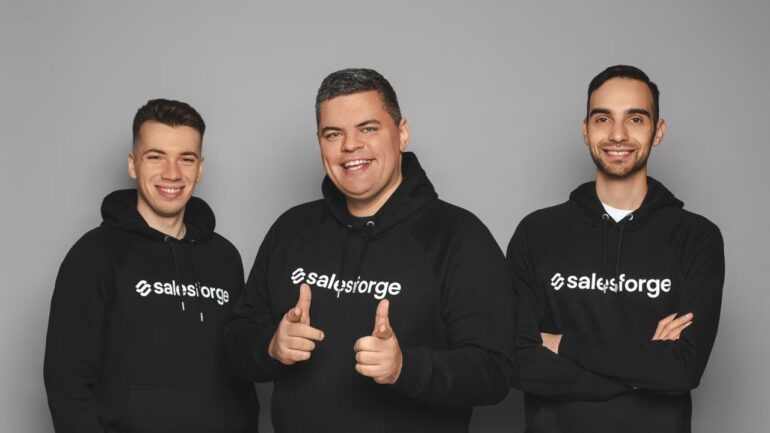- Salesforge, led by CEO Frank Sondors, obtains $500K funding to enhance sales team efficiency with AI technology.
- Sondors identifies the inefficiencies of traditional sales models and develops AI-embedded software to streamline operations.
- Salesforge offers two products, Salesforge and Mailforge, focusing on personalized email campaigns and streamlined infrastructure management.
- The company’s rapid growth, with over 800 clients and €1 million in ARR within ten months, showcases market demand for AI-driven sales solutions.
- Investors, including BADideas.fund and Spring Capital, recognize Salesforge’s potential to disrupt B2B sales dynamics with its innovative approach.
- Salesforge plans to leverage proprietary datasets for enhanced personalization and expand its capabilities through CRM integrations and autonomous features.
Main AI News:
In the realm of sales, a significant transformation is underway. Sales underperformers beware, for an AI-copilot might soon take your place, empowering a streamlined team to clinch deals more effectively.
Frank Sondors, the CEO and co-founder of Salesforge, possesses a rich background in sales spanning over a decade, culminating in his role as the Senior Vice President of Sales at Whatagraph, where he managed a team of approximately 50 individuals. He perceives the traditional model of large, costly sales teams, reliant on volume-centric strategies like mass emailing and cold calling, as antiquated. Sondors articulates, “I noticed that our team was overly bloated in terms of headcount, indicating a software deficiency.”
Sondors elucidates the prevalent issue across sales teams as companies strive to expand their customer base while preserving operational efficiency. He states, “B2B sales leaders are increasingly caught between a rock and a hard place—on one hand, customer personas demand personalized campaigns, while on the other, stricter email deliverability standards render traditional spray-and-pray methods obsolete.”
Salesforge introduces a novel approach, emphasizing multi-source AI personalization coupled with enhanced deliverability, all underscored by a flexible, usage-based pricing structure, effectively addressing the challenge of bloated sales teams.
The company unveils two flagship products: Salesforge and Mailforge. While Salesforge specializes in crafting bespoke emails across languages with a focus on deliverability, Mailforge offers indispensable infrastructure support along with streamlined domain and mailbox management.
Sondors emphasizes the essence of effective sales lies in delivering tailored emails, avoiding the impersonal template deluge that characterizes most sales communications. He comments, “A staggering 90 percent of sales emails I receive are generic templates, lacking personalization and relevance to my business needs.”
Salesforce serves as its initial consumer, employing the product thesis as a trial ground for customer and investor engagement. Having met his co-founders on the Y Combinator platform in January 2023, Sondors and his team swiftly developed a Minimum Viable Product (MVP), followed by a beta launch. Within months, Salesforge amassed over 100 clients, a number surging to over 800 across the US and EMEA, generating over €1 million in Annual Recurring Revenue (ARR) with just a four-person team.
Salesforge’s clientele spans diverse industries, ranging from trucking to SaaS companies, consultants, and even competitors leveraging its software. The company has garnered significant investor interest, securing a $500K investment from prominent backers including BADideas.fund, Spring Capital, Fiedler Capital, and super angel Maciej Zawadzinski, catapulting its ambition to redefine B2B sales dynamics.
Raimonds Kulbergs, CEO of BADideas.fund, acknowledges Salesforge’s strategic positioning, stating, “Salesforge seizes an opportunity in a market undergoing tectonic shifts, paving the way for new entrants. Leveraging AI-driven personalization and stringent email controls, alongside escalating labor costs, Salesforge champions the viability of single-person sales teams.”
Looking ahead, Salesforge aims to transition from publicly available language models to proprietary ones, leveraging tailored datasets to craft highly effective emails tailored to specific industries and target customers.
This latest funding injection will fuel Salesforge’s expansion initiatives, enabling the exploration of new channels and the integration of autonomous capabilities and Customer Relationship Management (CRM) tools to streamline the entire pipeline generation process.
As Salesforge propels sales optimization through technology, Sondors reassures that while software may displace underperforming personnel, exceptional sales professionals will always thrive. He asserts, “Truly exceptional salespeople will never be replaced; however, software can augment or replace underperforming personnel, a segment comprising at least 50 percent of sales teams.“
Conclusion:
Salesforge’s success underscores the growing demand for AI-powered sales solutions in the market. By addressing the inefficiencies of traditional sales models and offering tailored, data-driven approaches, Salesforge has positioned itself as a frontrunner in revolutionizing B2B sales dynamics. The significant investment secured signifies investor confidence in Salesforge’s potential to reshape the sales landscape and drive efficiency across diverse industries.

